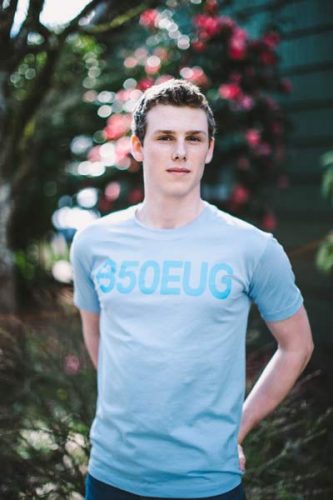
Your individual choices affect climate change — if you drive a car, or what car you buy, what products you consume and if you reuse and recycle.
At the same time, major corporations have spent millions of dollars denying climate change. As Big Tobacco once denied cigarette smoke is unhealthy, corporations such as the Koch Industries and ExxonMobile have spent millions to sow doubt about climate change, despite knowing the science is real.
The fossil fuel industry would like you to think it’s all your fault. Climate change gets blamed on consumer choices, not corporate misdeeds. Can you affect climate change? Yes, and you can fight it. As anthropologist Margaret Mead said, “All social movements are founded by, guided by, motivated and seen through by the passion of individuals.”
Kelsey Juliana, age 20, has been fighting climate change since she was 15, from a state lawsuit in 2011 to the federal lawsuit argued March 9 in federal District Court in Eugene. Juliana and 20 other plaintiffs, the youngest age 7, say that the federal government is violating their constitutional and public trust rights as a result of decades of promoting the development and use of fossil fuels.
Don’t believe in global warming? “Go outside and observe nature, explore,” Juliana says. “Have fun, then over time you will notice a change. I’ve noticed it.”
Have you noticed it? Climate change is real; now go do something about it. — Camilla Mortensen
KAIA HAZARD SITS-IN FOR DIVESTMENT
Kaia Hazard, a senior in environmental science with a minor in Spanish at the University of Oregon, is the campaign coordinator for Climate Justice League’s Divest UO campaign. Divest UO is a student-led campaign dedicated to ending the UO Foundation’s investments in fossil fuels.
When Hazard moved from Gresham to Eugene in 2012, she hadn’t declared her major, but after getting involved with environmental activist groups on campus her sophomore year, she says she couldn’t stay away: “You can’t not stay involved.”
Hazard helped organize the Feb. 16 sit-in outside the office of UO President Michael Schill to protest the UO Foundation’s investment in fossil fuels. The UO Foundation is a nonprofit organization that gifts money to further the university’s mission, according to its website. Hazard says she hopes eliminating fossil fuels from the foundation’s portfolio will lower the university’s carbon footprint and diminish its impact on the environment.
Tobin Klinger, the UO’s senior director of public affairs, says the foundation’s investment in fossil fuels adds up to less than one percent of its annual endowment, and that the university’s role is to follow the foundation’s lead.
“We actually have a very common belief system surrounding fossil fuels and the impact they’re having,” Klinger tells EW. “The foundation’s current model for the way they purchase securities, their current estimate for the actual holding related to fossil fuels is less than one percent, and nine percent of the portfolio is spent on green technology.”
Although Schill doesn’t have a vote in the foundation’s decisions, his support for divestment, Hazard says, would help their cause.
The Divest UO group plans to continue the sit-in through March 16, Hazard says. “We know it’s not going to be an immediate effect,” she adds. “After the sit-in is over, it’s important to keep up the pressure because we’re a campaign that isn’t going anywhere.”
Graduating this June, Hazard says she’d like to find work that combines her degrees studying environmentalism and Spanish.
“That would be ideal if I could go work on environmental causes in Central or South America,” Hazard says. “It’s a region that needs a lot of help and attention, especially environmental justice issues that are plaguing the area.” — Mohammed Alkhadher
YOUTH EARTH GUARDIAN
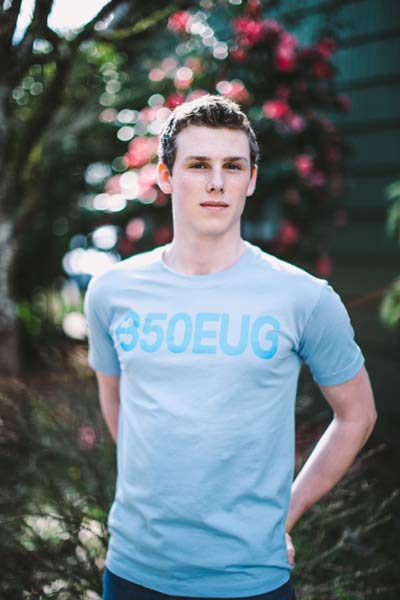 |
Climate change needs to be addressed for the sake of the next generation — it’s the broken-record mantra of city officials and politicians throughout the nation.
At South Eugene High School, the next generation is taking it upon itself to address climate change through the Earth Guardians 350 Club, which began last September.
Sage Fox, 18, is a leader and co-founder of the club. A senior at South Eugene High School, he advocates for climate action through Earth Guardians 350.
Fox says the mission of the club is “to give South Eugene students a voice in climate change topics, use our position as youth to advocate for climate change issues and back up local organizations by saying we are the youth and we demand climate change action.”
The club started when Fox and fellow co-founders Wesley Georgiev and Corina MacWilliams noticed a lack of environmental clubs at South Eugene.
“I learned about climate change at an early age and I’ve seen the effects on my life. Having the educational background to know what much worse effect it will have, I felt compelled to take action against it,” Fox says. “I thought working with 350 and starting a club at South would be the best way I could maximize my voice in this issue, trying to work from the political standpoint against climate change.”
The club, which has around 25 members, meets every week to discuss climate issues, listen to guest speakers and make posters for club activities.
Outside the classroom, Fox says, members of the South Eugene 350 Club attend Eugene City Council meetings to put pressure on city officials to implement the Climate Recovery Ordinance which, according to the city of Eugene, would reduce fossil fuel use by 50 percent by the year 2020.
Fox says that when he testifies at City Council meetings, he explains his observations — from skiing during the winter and seeing less snow each year to wildfires he has seen while backpacking in the summer.
Overall, the main message Fox and his peers convey is a sense of urgency regarding climate change. Ultimately, Fox explains, the club wants “the city of Eugene to take its part in the worldwide movement to stop climate change.”
Despite the fact that Earth Guardians 350 members represent a younger demographic of activists, Fox says the club’s message has garnered respect and been well received.
“City councilors and legislators are usually very receptive to the youth voice because youth do not really get involved in politics very often and are usually not very active citizens,” Fox says.
One impediment to implementing the Climate Recovery Ordinance, he says, is that city officials have other priorities, such as urban expansion and building apartments.
“The biggest obstacle we have right now is bad priorities,” Fox says. Check out the national Earth Guardians movement at earthguardians.org. — Claire Rischiotto
INTERFAITH EARTHKEEPERS AND INVESTING IN ACTION
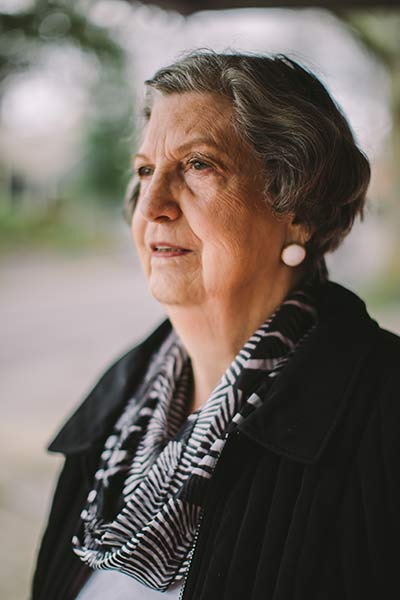 |
Jane Smith, a member of Eugene Interfaith Earthkeepers Alliance (EIEA) through the First United Methodist Church, is taking action against climate change.
The EIEA is made up of different congregations across Eugene coming together to educate the community and respond to environmental issues. Smith says the Interfaith Alliance holds events and invites performers and speakers to help raise awareness to climate change and issues such as pollution and ocean warming.
“We all practice our faith in different ways,” Smith says. “We’re trying to make climate change more visible to help educate people on the crisis of climate change.”
Smith, 83, has been a member of the alliance for the past five years. She completed a graduate degree in social work, but later went into banking and retired as the CEO of the Hawaii Community Foundation, where she lived before moving to Eugene. She says it was in Hawaii, while reviewing various climate rehabilitation proposals, where she became aware of the consequences of climate change.
“Hawaii is so far from any other land,” she says. “We were very concerned with the ocean and the environment.” Interfaith Earthkeepers focuses on that concern with the environment and “activating communities of conscience to serve and keep our sacred planet,” according to the Episcopal Church of the Resurrection.
“We meet once a month with other church representatives to try to reduce pollution with certain activities,” Smith says.
Now that she’s retired, Smith is getting more creative with her investment portfolio and is urging others to consider the same. “It doesn’t make sense to hold our investment portfolio,” Smith says. “We’re investing our capital in better opportunities.”
Smith says she’s helped create jobs for women in developing countries and other environmental initiatives through her investments.
“We feel especially mandated to be good stewards of this Earth,” Smith says. “God gave us Earth to take care of and we haven’t done a good job. We need to clean up our act.”
The Earthkeepers meet on the second Wednesday of every month at the United Lutheran Church on Washington Street. They last met March 9. — Mohammed Alkhadher
ACTING FOR A HEALTHY CLIMATE
Zach Mulholland first started hearing about climate change in middle school, he says. He knew it was important, but like many, he didn’t know what to do about it. Years later, Mulholland, now 31, says, “global warming is the biggest issue we are facing right now” from extreme environmental conditions such as habitat loss to plastic pollution.
Climate change exacerbates problems we are trying to deal with in society, Mulholland says, like feeding, sheltering and providing water to future generations.
Mulholland went to community college in Bend, interned with Oregon Rep. Phil Barnhart and went to the UO, where he worked with OSPIRG and was a founder of Divest UO, he says. He brings that background and experience to coordinating the Healthy Climate Coalition, made up of 35 groups trying to bring about climate change legislation in Oregon.
The Healthy Climate Act (see EW 1/28) didn’t make it out of the short legislative session, despite a rally in Salem Feb. 3 that brought 400 people to the capitol calling for greenhouse gas legislation. “It’s frustrating as a young person that the best humanity seems to be hoping for is terrible,” he says of his work to reduce greenhouse gas emissions.
“The science is very clear,” Mulholland says, “drought, salmon die-offs. We need to substantively reduce greenhouse gases. And for those who really recognize the science, I think we not only want to keep global temperatures from above 2 degrees Celsius, ideally we need to bring greenhouse gases back down over the long term.” We need to get back to a zero-degree increase rise, he says.
As for the Healthy Climate Act itself, it “didn’t get the level of attention to be a priority and get though a short session given the short time frame,” he says. And now the climate community will come to together and figure out the best strategy for a “comprehensive climate policy that we can” get through.
In one ray of hope, Mulholland says that in the Legislature’s budget bill there was to be $230,000 allocated “so that the DEQ [Department of Environmental Quality] could hire someone to look at market-based mechanisms for carbon reduction and how they are implemented elsewhere and could be implemented in Oregon.”
Mulholland says this would let the DEQ get its “feet wet” if the Healthy Climate Act is passed in next year’s session, which “hopefully we can still get it implemented in 2020.” Back in 2007, the Legislature voted to reduce greenhouse gas emissions 10 percent below 1990 levels by 2020 and 75 percent below 1990 levels by 2050, but these goals were merely aspirational.
We need bigger institutional change, Mulholland says. He says young people who see the problem and want to get involved should join. He names Divest UO, Earth Guardians, Our Children’s Trust, 350.org and the fight against liquefied natural gas as examples. And if you see a means to make a change exists elsewhere but not here, “know you can make those changes where you are.” — Camilla Mortensen
BIKING FOR PEOPLE AND PLANET
Shane MacRhodes says he wants to see more kids on bikes. It’s good for the environment, he says, but more tangibly, it’s good for kids.
As program manager for Eugene Springfield Safe Routes to School, MacRhodes oversees a fleet of bikes that moves from school to school, giving kids an opportunity to learn biking and practice safe riding.
MacRhodes says the program serves more than 1,000 kids in the Eugene-Springfield area by offering a nine-hour class on the rules of the road. Fifth and sixth graders learn how to signal, make turns and handle intersections, among other skills.
“For me, it’s about rediscovering childhood and independence,” he says. “Many people who rode as kids remember that freedom they had, and we’re not giving that freedom to kids now.”
A culture of fear has fostered a reluctance to allow children to play and explore on their own, MacRhodes says, even though crime has trended downward over time.
“We’re protecting our kids to death,” he says, adding that the most recent generation is the first to have a lower life expectancy than the previous generation. “It all has to do with inactivity and obesity — the diseases killing our kids are about inactivity and poor food.”
That’s why it’s important to foster an interest in biking early, he says, and make Eugene’s infrastructure friendlier to bikes.
MacRhodes’ own passion for biking started when he was a child growing up in Eugene, exploring the river path system. As a teenager, he moved to Alaska, where he rode his bike to his first job. He returned to Eugene to pursue his higher education, attending Lane Community College and the University of Oregon, and that’s when a bike became his main form of transportation.
After graduating, MacRhodes took a job with the Center for Appropriate Transport (CAT) where he “realized what bikes could do to transform cities,” he says. “I like the vision of what a city could be if built around people walking and biking rather than people in cars.”
MacRhodes traveled to Europe and attended a worldwide bike conference, where he heard about cities like Copenhagen that chose to build infrastructure with pedestrians and bicyclists in mind. For the first time, he imagined the possibility of cities free of spaces devoted to the parking and storage of vehicles.
“It really blew my mind,” MacRhodes says. “We have good walking and decent biking, but nothing on the scale of cities that planned for better walking and biking.”
Current infrastructure isn’t equitable, he says, and it’s largely tipped in favor of vehicles. But, he asks, “what if we built our cities so that it’s easy for kids to walk and bike to school?”
And that’s part of MacRhodes’ mission — to see the Eugene-Springfield area become more bike-friendly. Eugene is a better place to bike than Portland, he argues, but Eugene still has some missing links. Connectivity plays an important role in making communities more accessible by foot or by bike.
MacRhodes says he’d like to see a connection between the Amazon bike path near Roosevelt Middle School and Eugene’s river path system, something separate from the main roads to create a “stress-free environment” for biking. “If the city built more of that infrastructure, it could be revolutionary,” he says, but “it will require a change in people’s perspective that cars need all the space.”
Part of that perspective is thinking globally and reducing emissions through choosing not to drive. “I think it’s an important piece to this,” MacRhodes says. “I value people who are working on that piece and really making that connection, and it’s always something that’s at the back of my mind.”
But, he says, the impact biking can have on kids is always front and center.
“As a bike advocate and now as a dad, it’s clear to me that the health of our communities is dependent on our kids becoming more healthy and having more freedom,” he says. “That’s the core piece of why I do this work.” — Amy Schneider
CLIMATE CHANGE AND COMMUNITIES
Joel Iboa was born in Eugene and raised in the Whiteaker neighborhood. He went to Sheldon High School, and his Mexican-born parents made sure he grew up knowing how to read and write in Spanish.
“I spent a lot of my summers with my cousins in Trainsong,” he says. Over the years the people of the Trainsong neighborhood of Eugene have had their lives affected by the diesel smoke of idling trains and air and groundwater contamination from the old Union Pacific railyard.
After graduating high school, Iboa stayed in Eugene. He took a class at the University of Oregon on corporate crime, examining incidents such as the Bhopal gas disaster and the BP oil spill. “It’s one thing for violence to occur from one person to another, but what happens when a state or corporation, who you can’t touch, hurts people?” he asks.
In his last two years at the UO, he was part of the Coalition Against Environmental Racism and began to delve into climate change and how it’s “not just about protecting wildlife, humans are part of the environment, too, and live in the capitalist society that produces products and waste.” There’s going to be bad stuff produced, he says, so where is it going to go?
After graduating in June of 2014, he applied for a job with Beyond Toxics and less than two years later was speaking before a crowd of 400 people at the capitol in Salem about social justice and climate change.
“Climate change is important to the environmental justice community,” Iboa says. “Low income, rural communities, communities of color — disadvantaged communities are the first to feel the brunt of climate change.” He points to how low-income communities feel the changes of global warming first in natural disasters throughout the world, such as Hurricane Katrina.
He says currently Beyond Toxics is working on a questionnaire on what youth in Eugene think about climate change and how it will impact them. He expects the survey to finish up in the next two weeks.
From Eugene’s urban growth boundary and how that will affect homes in industrial areas to chemicals in the work place, Iboa and Beyond Toxics work to safeguard communities from chemicals and climate change. “People rely on these places for work,” he says of polluting industries, “and deserve to be protected from these chemicals.” — Camilla Mortensen
CLIMATE AND THE CITY
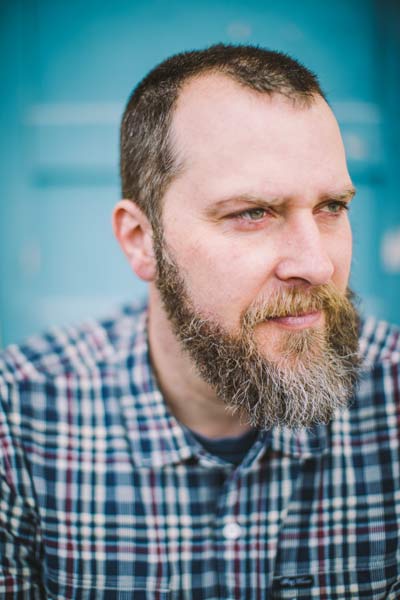 |
Matt McRae is the climate and energy analyst for the city of Eugene. He says, “I spent most of my 20s working for the National Park Service in Yellowstone doing backcountry trail work.” He got a degree from Utah State in natural resources management and started off in Eugene in 2002 working in Parks and Open Space as a volunteer coordinator.
When the climate and energy position was created, originally as a temporary position, in 2008, “I jumped at it,” he says.
In 2009 and 2010, McRae managed the effort to create Eugene’s first community Climate and Energy Action Plan. Currently his duties include managing an internal operations greenhouse gas inventory as well a community-wide inventory. This includes more obvious greenhouse emitters like transportation fuels as well as things many Eugeneans don’t think about, such as landfill emissions, as he tries to gauge a total emissions footprint.
McRae was also heavily involved in Eugene’s climate and hazards vulnerability assessment. “We didn’t have a full understanding of impacts to community systems from climate change,” he says. We knew about warming and lower river flows, “but not implications for public safety or water systems.”
The work on climate change was merged with assessing the city’s vulnerability to natural hazards. “It took almost two years,” McRae says. “The largest impacts we expect to see are related to natural resources: fish, regional forests, river flows and river temperature.” The good news is that when it comes to things like urban infrastructure, drinking water and housing, Eugene faces “less impact from climate change overall as compared to other cities with rising sea levels, hurricanes and heat waves.”
That’s for better or for worse, McRae says, because that can make climate change less of a concern for people.
Looking ahead, McRae says that he’s been examining the impacts of climate change on urban forests. Urban forests can help capture carbon, and their shade can make pavement last longer and reduce the use of air conditioning.
Ironically, the best street trees are hard to get, McRae says. Some of the native Oregon white oak and native California black oak that are more resistant to climate change are not readily available in local nurseries. — Camilla Mortensen
LOCAL FOOD AND CLIMATE ACTIVISM
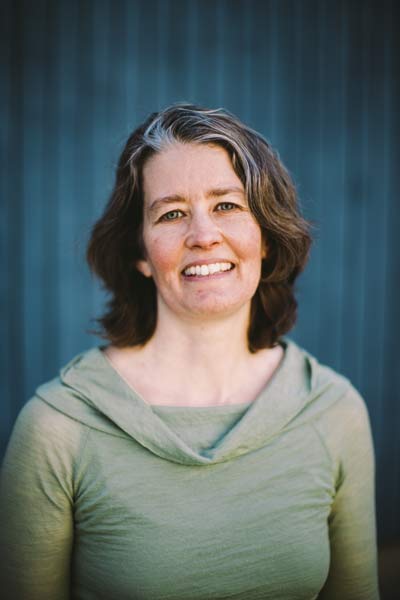 |
It’s important for kids to understand where their food comes from, says Megan Kemple of the Willamette Farm and Food Coalition. Kemple has helped Lane County kids learn more about local food for almost a decade through the coalition’s Farm to School Program.
The program provides access to healthy, local food for low-income students in five school districts: Eugene 4J, Bethel, Springfield, South Lane and Junction City.
The Farm to School Program allows students to participate in activities that include field trips to farms, taste-testing local foods during lunch and cooking with food the students have harvested.
“I also do the work because I believe that as a result of climate change we may be facing a very different kind of food system in the future, one in which our food isn’t easily transported up and down I-5 and where infrastructure might be disrupted,” Kemple says.
In order to overcome such disruption, Kemple explains that all community members of all social classes need to have access to locally sourced foods.
Outside of Kemple’s work hours, she has dedicated her time as a volunteer with 350 Eugene’s work group “Cap the Gas,” which tried to pass the Healthy Climate Act in the Oregon Legislature short session.
“I do all of this climate work out of passion and concern, and a feeling of urgency,” Kemple says.
The Healthy Climate Act would have put a limit on and reduced Oregon greenhouse gas emissions, Kemple says.
The 350 Eugene work group held regular meetings every two weeks, where members planned meetings with legislators and discussed updates to the bill.
“I do this work because I am very concerned about climate change, and I think Oregon needs to do its part,” Kemple says. — Claire Rischiotto
RETIRED NAVAL OFFICER, OFF THE GRID, AGAINST CLIMATE CHANGE
Retired naval officer Patty Hine co-founded 350 Eugene with her partner, Deb McGee. 350 Eugene is a chapter of 350 Oregon, a grassroots climate activist organization. The 350 movement is a global grassroots network that seeks to keep carbon in the ground, build a new, more equitable low-carbon economy and pressure governments into limiting emissions.
When Hine retired and moved to the Pacific Northwest, she got a job at Lane Community College teaching computer applications. “I never taught anything about environmentalism, but I embodied the low carbon footprint lifestyle,” she says.
Hine tells EW that when gaming and simulation began to take over the computer information and technology department at LCC, the school focused on how to attract students who were interested in creating virtual worlds. She says we’ve become so distracted by technology and materialism that we’ve lost sight of what’s real.
“I was just so not interested in that,” Hine says. “How can a virtual world hold a candle to what I’m doing? They wanted to bring in candy and soda machines, so I said, ‘I quit,’ and moved to another faculty position.”
Hine says she lives with her partner and their two children in a log house, off the grid. They run an organic farm, compost their waste and will soon have a solar water system. By farming her own food, producing compost and utilizing renewable energy, Hine is embodying the low carbon lifestyle.
“We’re kind of old hippies, but I’m a retired military officer,” she says.
She’s not very concerned with technology, Hine says. She and her partner share a cell phone, and they don’t have a TV, but they were early adopters of electric cars. She adds that her dedication to the Earth is a product of her faith and the belief that she’s responsible for the world’s well-being. “It’s shocking how many people don’t take their faith seriously,” Hine says.
She says she wants to live her life as an example for how to marry faith and environmentalism.
“We have a fierce commitment to a love- and joy-filled world. I think that comes from my personal upbringing. Christianity at its root is a pacifistic religion, and we’ve so screwed that up,” Hine says. “I’m bound and determined to make that right as an example of my life.” — Mohammed Alkhadher